 |
 ALICE MARSLEN DAPHNE FOWLES DORIS CHAMBERS MARGARET MARSLEN |
|||
|
Name: Alice Marslen
Age: 77 Occupation during 1939: Child living with her family at Loch Valley near Noojee when the fires swept through their town. Age at time of fire: 12 Location of interview: Bairnsdale "It was frightening, because it was all flames and smoke and it looked like it was out of control. And it was coming towards us." I was 12 years old and we were living at Loch Valley, north from Noojee. Our Dad was working at Saxton’s sawmill, at Tanjil Bren, and he was sent home because of the danger. Dorothy and Ben Saxton and a young mill hand were killed in a dugout at Dad’s mill during the fires. There were two fire fronts heading our way and they said they were going to join. We knew the fire was coming, and when my Dad came home, he let the horses go. He used to ride the horses up to the mill and back. He put the bridles and saddles in the willow trees beside the river, so they wouldn’t get burned and he just opened the gate and let the horses go down towards the river. He couldn’t find them for a long time, for months afterwards. So we were expecting the fires and these men in a utility came to take us into Noojee, to the river. We didn’t have a car, but these chaps came out and they said, “We’re taking you into the Noojee Hotel, and maybe if the fire gets worse and they think the Hotel is going to get burned, we’ll take you down to the river.” And we just all piled in and off we went. "The fire was so fierce that the wind blew the sheets off the roofs of the houses around us, and blew them down into the paddocks, which started more fires." I remember sneaking out to look out the front door of the Hotel and seeing the fire all going across the hill just in front of the Hotel. Oh, it was frightening, because it was all flames and smoke and it looked like it was out of control - I suppose it was out of control. And it was coming towards us. They took me away from the front door then, and soon after that we went down the back stairs to the river. I didn’t like to walk into the river because I had my shoes and socks on - it didn’t seem right to walk in. My mother was holding the baby, Heather, who was three months old. They put the blankets over us and threw water on top of the blankets so our hair wouldn’t get sparks in it. There was Mum and Dad and Frank. Frank was the eldest and I was the second-eldest, then there was Charlie, Jim, George and John and the baby, Heather – nine of us all up. There was smoke everywhere. We couldn’t see anything for smoke and I don’t know how long we were there, but it was getting dark. The fire was so fierce that the wind blew the sheets off the roofs of the houses around us, and blew them down into the paddocks, which started more fires. And then fires came along the banks of the river, but because we had the blanket over us and the blanket was wet, we were saved from getting burned. "We were frightened for all of us. We had no way of putting the fire out and couldn’t do anything to fight it." The wind was dreadful and we were all scared, of course. We were frightened for all of us. We had no way of putting the fire out and couldn’t do anything to fight it. We knew the fire wouldn’t stop until the two fires met and that’s what put them out - when they both met. Whenever I smell gum leaves burning it reminds me of the fires in ’39. You never forget it. When the fire went through Noojee, they decided to take us to Warragul, because they didn’t know if our house was still standing or not. John and I had to go together. I used to look after John; he used to sleep with me and he had a dummy. So some volunteers took John and I to somebody’s house, and Mum and Dad and the rest of them went to a different place. "There were all these dead fish floating down the river. It must have been so hot further up, or narrow and maybe the smoke killed them, I don’t know." We were put to bed and then the next morning, we got up and we were having breakfast and John kept eating toast all the time. He must have been hungry and he lost his dummy somewhere. Then they got word that our house was still alright, so we went back and we got a lot of help with clothes and food and stuff, relief food. Us kids went down to the river, which was only a few hundred yards from the house, and there were all these dead fish floating down the river. It must have been so hot further up, or narrow and maybe the smoke killed them, I don’t know. We just threw them out on the bank. The laundry next to our house was burned, so we were very close to losing our house. It was saved by some truckies that came along. They took shelter at the river and they put the laundry out. We were luckier than some because we still had our beds and our clothes and all that, but the hardest part for me I think was going back to school. They had put a tent up for us to go to school in because the school had burned down. It was wintertime and it was so cold that the ink in the inkwells was frozen. It was very hard to go to school in wintertime in a tent. There was a little burner oven there that the teachers used to burn wood in it, but we didn’t get any sort of warmth from it. "There was a saucepan and a kettle, but everything else around it was burned. It looked so awful because it made you think, what were they going to have for tea?" My father had been a blacksmith at Saxton’s mill before the fires. I remember he had a new pair of working boots and he dug a hole in the ground and buried them before he left the mill. When he went back after the fires to work, he dug up his new working boots and they were alright. Everything else was burned. It just goes to show how different life was back then. They couldn’t think like they do now, having people throwing their shoes away all the time. Anyone living now wouldn’t understand what it was like to have a new pair of shoes, how expensive that was, how important it was to make sure they were safe because there just wasn’t the money to buy another pair. A couple of days after the fires, I remember going past the houses that had been burned. There was a saucepan and a kettle sitting on the stove, but everything else around it, including the house, was burned. It looked so awful because it made you think, what were they going to have for tea? Read more about Ben & Dorothy Saxton in the Newspaper Section Read more about strange events that occurred after Black Friday in the Newspaper Section |
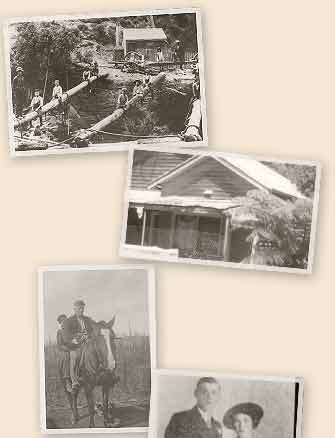 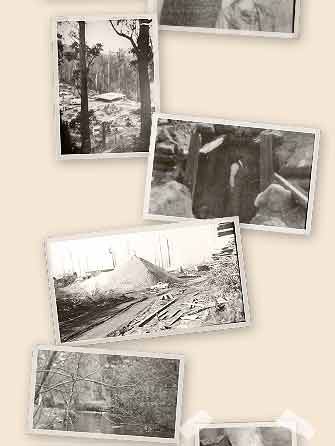 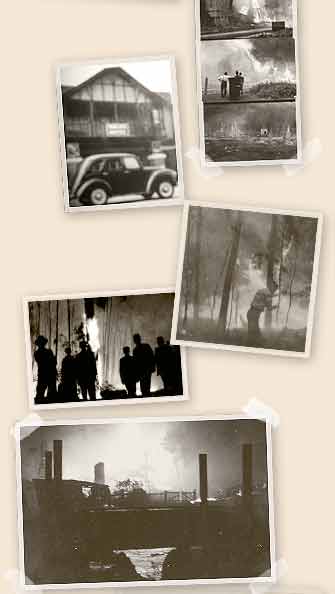 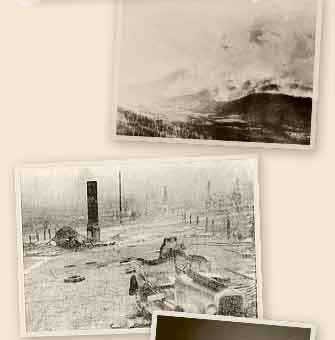 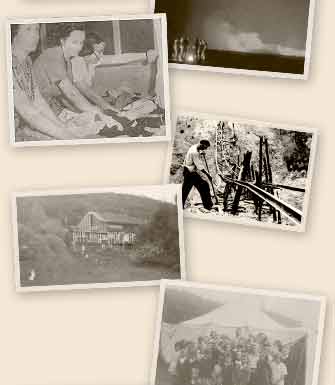 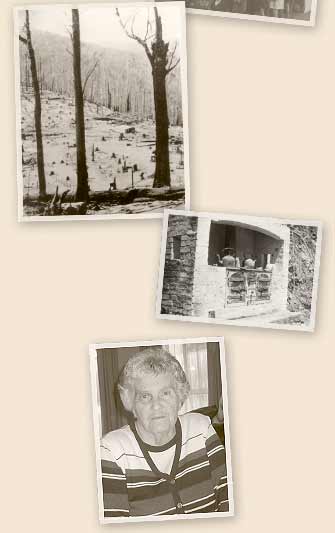
|
||
 |